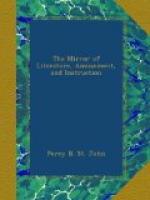(For the Mirror.)
All power of fancy over reason
is a degree of
insanity.—Johnson.
In a former number I gave some observations on apparitions, and I shall here continue my remarks.
The argument that was used by Dr. Johnson was founded on premises that are as inadmissible as his conclusion, viz. that the popular opinion in favour of the reality of apparitions could only obtain universal credence by its truth. This is very plausible, but destitute of foundation. Does the learned doctor mean to deny the universality of errors? does he mean to call the whole body of the learned and enlightened cavillers? and that because they are not willing to consent to his monstrous opinion? To reverse the argument, does he mean to deny the truth of the Scriptures, or is he bold enough to assert that they have received universal credence? So much for the arguments wielded by Dr. Johnson, who has not been unaptly termed the Colossus of Literature. The idea that departed spirits revisited the earth, probably took its rise from the opinion of the immortality of the soul, which was very general in both ancient and modern times.[2] This supposition is most consonant with probability. It is always to be remarked that this species of superstition is most prevalent in those countries where learning and reason have made but little progress. The demons [Greek: Daimones] and genii of former times were exactly the same as the ghosts of this; the same attributes, the same power, and the same malice were observed of one, as are now attributed to the other. By the Chaldeans these demons were divided into two kinds, good and bad. But as it is foreign to my purpose to enter into an investigation of the opinions of the ancients on this subject, I shall content myself with referring the curious reader to Stanley’s History of Philosophy, a deservedly popular work.
[2] It must not be supposed that the opinion on the immortality of the soul was confined either to Christians or Jews; according to Herodotus, (lib. 2) the Massagetae believed in the immortality of the soul; the most eminent of the ancient philosophers invariably advocated that doctrine, one of the most important in the Christian’s Creed.
I shall here recount one of the most extraordinary tales relating to this subject that I ever heard; I believe the solution is evident, and I am not aware that it has appeared before; but if it has, some of the readers of the Mirror may not have seen it.
A surgeon of Edinburgh was confined to his bed by some illness, and at “the dewy hour of eve,” when the room was lighted by nothing but the glimmering and flickering light of a wood fire, he perceived a female sitting at the foot of the bed clothed in white! Imagining that it was some defect in his sight, he gazed more intensely at it, still it was there. He then raised his hand before his eyes and he did




